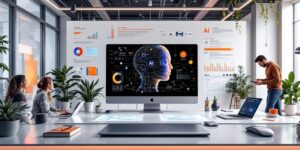Artificial Intelligence (AI) is changing the way we live and work. It is not just a trend; it’s a powerful tool that is reshaping industries, enhancing creativity, and driving innovation. From healthcare to finance, AI is making processes faster and more efficient. This article explores how AI models are transforming various sectors, the ethical issues that arise, and what the future holds for AI in our daily lives.
Key Takeaways
- AI is improving healthcare by providing better diagnostics and treatments.
- In finance, AI helps detect fraud and manage risks effectively.
- Manufacturing is becoming more efficient with AI optimizing production processes.
- AI is driving creativity by generating new ideas and solutions.
- Ethical considerations are crucial to ensure AI benefits everyone.
The Role of AI Models in Transforming Industries
AI models are changing the way industries operate, making processes faster and more efficient. These technologies are not just tools; they are game-changers.
AI in Healthcare: Enhancing Diagnostics and Treatment
- AI helps doctors diagnose diseases more accurately.
- It can analyze medical images quickly, leading to faster treatment decisions.
- Personalized medicine is becoming more common, thanks to AI’s ability to analyze patient data.
AI in Finance: Revolutionizing Fraud Detection and Risk Management
- AI systems can detect unusual patterns in transactions, helping to prevent fraud.
- They analyze vast amounts of data to assess risks more accurately.
- Automated trading systems use AI to make quick decisions, improving market efficiency.
AI in Manufacturing: Optimizing Production and Maintenance
- AI-powered robots can perform tasks with high precision, increasing productivity.
- Predictive maintenance helps identify equipment issues before they cause problems.
- Data analysis from production processes leads to better supply chain management.
AI is not just about automation; it’s about unlocking new possibilities and improving existing systems.
AI Models Driving Innovation and Creativity

Generative AI: Creating New Content and Solutions
Generative AI is changing how we create things. It can produce new ideas, art, and even music. This technology uses patterns from existing data to generate fresh content. Here are some ways it’s being used:
- Writing stories and articles
- Designing graphics and logos
- Composing music and soundtracks
AI in Research: Accelerating Discoveries
AI is speeding up research in many fields. By analyzing large amounts of data quickly, it helps scientists find answers faster. Some benefits include:
- Faster data analysis
- Identifying trends and patterns
- Assisting in experiments and simulations
AI is not just a tool; it’s a partner in innovation, helping us explore new frontiers.
AI in Design: Enhancing Creativity and Efficiency
AI tools are making design work easier and more creative. They can suggest improvements and automate repetitive tasks. Here’s how:
- AI can generate design options based on user preferences.
- It helps in creating prototypes quickly.
- AI tools can analyze user feedback to improve designs.
In summary, AI models are not just changing how we work; they are opening up new possibilities for creativity and innovation.
Ethical Considerations in AI Model Development
As AI technology becomes more common, it’s important to think about the ethical issues that come with it. Here are some key areas to consider:
Addressing Bias in AI Algorithms
- AI systems can sometimes reflect biases found in their training data.
- This can lead to unfair treatment in areas like hiring or lending.
- To fix this, developers should:
- Use diverse data sets.
- Regularly check and update AI models.
- Be transparent about how decisions are made.
Ensuring Privacy and Security
- Protecting personal information is crucial. AI systems often handle sensitive data.
- Developers must implement strong security measures to prevent data breaches.
- Following regulations like GDPR helps ensure that users’ data is safe and used responsibly.
The Importance of Transparent AI Systems
- Transparency in AI means making it clear how decisions are made.
- Explainable AI helps users understand the results produced by algorithms.
- This builds trust and ensures that AI systems are fair and accountable.
In a world where AI is becoming more integrated into our lives, it’s essential to prioritize ethical practices to ensure technology benefits everyone.
By focusing on these ethical considerations, we can help create AI systems that are not only effective but also fair and trustworthy. When interacting with AI tools, you should be cautious about supplying sensitive information to protect your privacy and security.
AI Models and Economic Transformation

AI is changing the way we think about the economy. By automating tasks and improving decision-making, AI is set to boost productivity and create new markets. However, this transformation also brings challenges, especially regarding job displacement in some sectors.
Boosting Productivity Through Automation
- AI can handle repetitive tasks, allowing humans to focus on more complex work.
- It improves efficiency in various industries, from manufacturing to services.
- Automation can lead to faster production times and lower costs.
Creating New Markets and Industries
- AI is driving innovation, leading to the emergence of new sectors.
- Startups focused on AI solutions are rapidly growing, creating jobs and opportunities.
- Traditional industries are evolving, integrating AI to stay competitive.
Challenges and Opportunities in Job Displacement
- Some jobs may become obsolete due to automation.
- New job roles will emerge that require different skills.
- Reskilling and upskilling will be essential for the workforce to adapt.
The impact of AI on the economy is profound. As we navigate these changes, understanding how tech disruptions can inform the economic impact of AI is crucial. Discover learnings from three key historical episodes of rapid technological change that may help predict the economic impact of AI.
AI Models in Environmental Sustainability
AI is playing a crucial role in environmental sustainability by helping us understand and manage our natural resources better. Here are some key areas where AI is making a difference:
Predictive Analytics for Climate Change
- AI models can analyze large amounts of data to predict climate patterns.
- They help forecast weather conditions and assess the impact of natural disasters.
- This information is vital for planning effective responses to climate change.
Optimizing Resource Management
- AI helps in using resources like water and energy more efficiently.
- Smart algorithms can track usage patterns and suggest improvements.
- They are also used to monitor deforestation and biodiversity, which are essential for ecological balance.
AI in Conservation Efforts
- AI technologies are being used to protect endangered species and habitats.
- They can analyze data from various sources to identify areas needing protection.
- This proactive approach helps in maintaining biodiversity and ecological health.
AI’s ability to process vast amounts of data is transforming how we tackle environmental challenges. According to estimates, AI can reduce worldwide greenhouse gas emissions by 4%.
| Application Area | Impact on Sustainability |
|---|---|
| Climate Prediction | Better disaster response |
| Resource Optimization | Reduced waste |
| Conservation Monitoring | Enhanced biodiversity |
The Future of AI Models in Everyday Life
As we look ahead, AI is set to become a bigger part of our daily lives. From smart assistants to connected homes, AI will change how we live and work.
AI-Powered Personal Assistants
- Personalized Help: AI assistants will learn our preferences and routines, making them more helpful.
- Task Management: They can schedule appointments, send reminders, and even manage our emails.
- Voice Recognition: Improved voice technology will allow for more natural conversations.
Smart Homes and Cities
- Energy Efficiency: AI can optimize energy use in homes, reducing bills and environmental impact.
- Safety Features: Smart security systems will use AI to detect unusual activities and alert homeowners.
- Traffic Management: AI can help reduce congestion in cities by optimizing traffic signals and routes.
AI in Education and Learning
- Personalized Learning: AI can adapt lessons to fit each student’s learning style and pace.
- Tutoring Systems: AI tutors can provide extra help outside of the classroom.
- Data Analysis: Schools can use AI to analyze student performance and improve teaching methods.
As AI continues to evolve, it is crucial to address potential challenges, such as model collapse, where AI systems may lose touch with reality due to reliance on AI-generated data. This emphasizes the need for responsible AI development to ensure it benefits everyone.
AI Models in Enhancing Customer Experience
AI-Powered Chatbots and Virtual Assistants
AI-powered chatbots are changing the way businesses interact with customers. They provide instant support and can answer questions 24/7. These virtual assistants understand natural language, making conversations feel more human-like. This not only improves customer satisfaction but also helps companies save money on customer service.
Personalization in Marketing
AI is great at personalizing marketing efforts. By analyzing customer data, businesses can:
- Offer tailored product recommendations.
- Send personalized emails based on user behavior.
- Create targeted ads that resonate with specific audiences.
This level of personalization leads to better customer experiences and higher sales.
Improving Customer Service with AI
AI models help enhance customer service in several ways:
- Faster response times to customer inquiries.
- 24/7 availability, ensuring customers can get help anytime.
- Data analysis to understand customer needs and preferences better.
AI is not just a tool; it’s a game-changer in how businesses connect with their customers.
In summary, AI models are revolutionizing customer experience by providing instant support, personalizing marketing, and improving service efficiency. As companies continue to adopt these technologies, the future of customer interaction looks promising.
Conclusion
In summary, the future of technology is bright, thanks to AI. This powerful tool is changing how we live and work in many ways. From making tasks easier and faster to helping us create new ideas, AI is at the center of it all. It’s not just about improving businesses; it’s about making our lives better. As we move forward, it’s important to use AI responsibly, ensuring it helps everyone and doesn’t leave anyone behind. By focusing on fairness and ethics, we can make sure that AI leads us to a future filled with opportunities for all.
Frequently Asked Questions
What is the role of AI in healthcare?
AI helps doctors find diseases faster and improve treatments. It can look at medical data and images to help make better decisions.
How does AI change the finance industry?
In finance, AI spots fraud by checking patterns in transactions. It helps keep money safe and makes financial decisions quicker.
What are the benefits of AI in manufacturing?
AI makes factories run better by predicting when machines will break down. This helps save money and keeps production going smoothly.
How does AI promote creativity?
AI tools can create new ideas and art. They help people think outside the box and come up with fresh solutions.
What ethical issues come with AI?
AI can have biases, which means it might treat some people unfairly. It’s important to make sure AI works for everyone and keeps data safe.
How will AI affect jobs in the future?
AI might take over some jobs, but it will also create new ones. People will need to learn new skills to work alongside AI.


